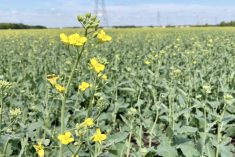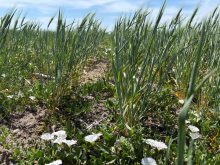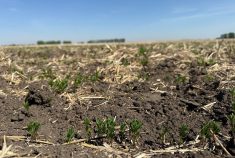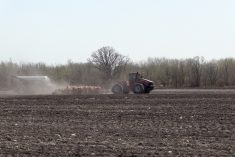MarketsFarm — Hay prices have continued to skyrocket across the Prairies as conditions remain dry enough that many hay growers won’t produce a first cut this spring.
“We’ve had a tough start here,” said Darren Chapman, chair of the Manitoba Forage and Grassland Association.
“We had a cold, dry spring with frost, so first cut in the pastures had a slow start. First cut will be ready later, and it’s possible the hay will mature quicker, so we’ll have lower yield.”
As of April 30, Agriculture and Agri-Food Canada’s Drought Monitor reported abnormally dry conditions stretching from Edmonton to Winnipeg, with pockets of moderate-to-severe drought conditions located across the Prairies near Swan River, Yorkton, Saskatoon, Regina, Lethbridge and Red Deer.
Read Also

Dryness poised to threaten Saskatchewan crops
Crops in Saskatchewan are developing in opposite directions, the province’s latest crop report said. Growing conditions in the province vary, with some areas receiving enough rain while other locations are experiencing crop stress due to hot, dry conditions.
This outlook follows abnormally dry growing seasons in 2017 and 2018, when hay yields were lower than average.
“With cattle coming off the pasture early in 2017 and a very poor hay crop in 2018, most producers have used up their reserves,” said Sheri Parkinson, president of the Manitoba Horse Council.
“I’m expecting another tough year for getting enough hay, and prices to remain high.”
One producer in Saskatchewan admitted he “got a bit greedy” when pricing his hay this spring.
“I saw $130 per round bale [prices] in Regina and Saskatoon, so I upped my prices from $100 to $120,” he said.
The producer explained that he also took land prices and equipment costs into consideration before making his decision.
“I asked myself, ‘Would I want to pay that?’ You hate to gouge people, and yet it has to be worth it.”
Experts familiar with the hay market anticipate the newly-imposed carbon tax in Manitoba, Saskatchewan and Ontario will increase the cost of shipping hay, further raising prices.
Louise May, an organic farmer south of Winnipeg, said the prolonged dry conditions caused her to rethink her growing strategy.
“I decided to cut and produce all of my hay in small squares instead of round bales,” she said.
“It was a lot more labour to get it off the field and into the shed, but I was worried I wouldn’t have enough hay, so I wanted us to waste less and economize more.”
Since May also purchases hay to supplement her crop, she noticed prices have significantly increased, “even from friendly sellers.
“I’ve heard of small squares going for $10 a bale right now, and that’s unheard of. It’s usually around $5.”
As worries of a Prairie-wide hay shortage have circulated since drought conditions began in 2017, rumours abound of producers waiting to sell in order to jack up prices.
“Everyone has to pay the price of a shortage,” May said.
“As a hay producer, I know you don’t get too many chances.”
Chapman anticipated prices will increase by up to 10 per cent in 2019, after 2018 yields were down by 30-35 per cent.
“If prices don’t go up there’s nothing to accommodate that loss,” said May.
“I don’t begrudge anybody, but it’s a telling tale of how our economy has been stressed because of the drought.”
While hay supplies remain tight, it’s too soon to tell if a bona fide shortage will occur.
“Mother Nature is throwing us a curve ball here,” said Chapman. “Hopefully she’ll send us a fastball again, and things will get back on track.”
— Marlo Glass writes for MarketsFarm, a Glacier FarmMedia division specializing in grain and commodity market analysis and reporting.















